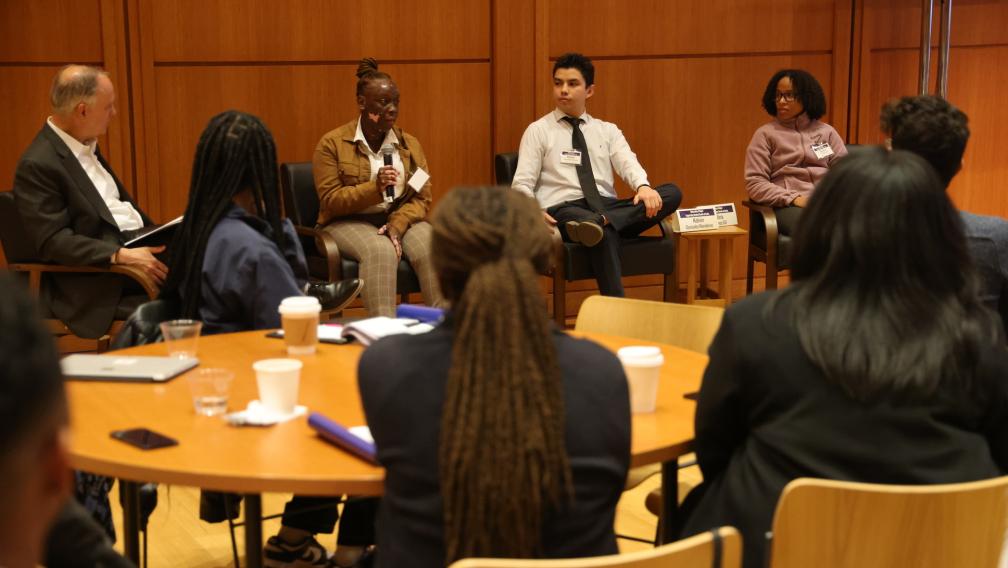University of Hope: Powering CUNY’s Engine of Economic Mobility

When Cristina Jiménez Moreta was applying for college, she did everything right. Yet she learned that her undocumented immigration status could endanger her chances of getting into college, or receiving financial aid even if she did. Cristina got in, and it was at Queens College where she found her voice as an immigrant rights leader. Cristina went on to found and lead the largest immigrant youth-led organization in the country, win a MacArthur ‘Genius’ fellowship, and be named to the TIME 100 list. Cristina’s story is just one of many stories exemplifying CUNY as an engine of economic mobility.
CUNY students today are overcoming their own obstacles, too. Take Danaysha, a student at Medgar Evers College, who has overcome homelessness twice and is completing her studies while raising three children. Or take Kelvin, a student at Queens College, who has juggled multiple jobs on his way to first completing an Associate’s degree in Environmental Science at LaGuardia Community College. Somes students, like Dalina at Bronx Community College, are not only managing their own affairs, but also stepping up as peer advocates helping fellow students connect to resources. Individually and collectively, students across CUNY’s 25 campuses are hustling through challenging circumstances in order to attain their degrees and achieve their dreams.
On November 8, Trinity Church Wall Street joined forces with Robin Hood and the Carroll and Milton Petrie Foundation to convene a symposium of 150 funders, policymakers, and CUNY stakeholders. Together, we learned how public college students across the country are persevering through barriers beyond their control, homed in on how CUNY is caring for its own in New York City, and explored potential solutions. We heard inspiring words from Cristina, deeply personal stories from students during the fireside chat, and calls to action from CUNY Chancellor Félix V. Matos Rodríguez and Trinity’s own Chief Philanthropy Officer, Bea de la Torre.
CUNY is already trying to address these students’ needs through a suite of supportive services. At Medgar Evers College in Brooklyn, the Transition Academy is providing students with food and MetroCards while also connecting them to public benefits. At the Borough of Manhattan Community College, 51 students facing homelessness have been housed, providing them with the stability they need to complete their studies. Across the three CUNY campuses in the Bronx, a new model for coordinated services is emerging through CUNY Cares. This model recognizes that when a student needs to go to three or four places to access services, each visit becomes an obstacle to their success.
In the short term, we need to meet the basic needs of CUNY students experiencing food and housing insecurity now. We can do this by:
- Proactively reaching out to students about public benefits they’re eligible for, such as SNAP, based on financial aid data, as public institutions in California are now required to do.
- Funding emergency student grants that can prevent students from going hungry or falling victim to eviction.
- Providing housing navigators on college campuses can help students understand options they are already eligible for and how to access them.
- Advocating for greater funding of Pell grants at the federal level and free MetroCards for CUNY students at the state and local levels.
In the long term, potential solutions would wrap around students in a coordinated manner, at scale. These solutions include:
- Scaling models like the Neighborhood Coalition for Shelter’s pilot dormitory in Long Island City, which provides housing and supportive services year-round to unhoused students.
- Funding CUNY and SUNY to collaborate with social service organizations, or vice versa, funding those organizations to proactively partner with public college systems.
- Creating networks of flexible job opportunities on or near CUNY campuses, helping students balance their financial needs and professional development with their academic and personal responsibilities.
- Streamlining students’ eligibility for public food benefits like SNAP through the Farm Bill passed by Congress, and taking advantage of existing federal flexibility in the medium term.
“I’m hoping we can all have a moment of conscience together,” said CUNY Professor Nick Freudenberg during the symposium. CUNY has always been an important institution and it now serves almost 250,000 students across its 25 campuses. That need is only going to grow. Applications have quadrupled this fall amidst a coordinated campaign and fee waivers, but experts warn that some of this demand comes from students experiencing the highest levels of financial insecurity. It is our job as New Yorkers to ensure that they can succeed.





